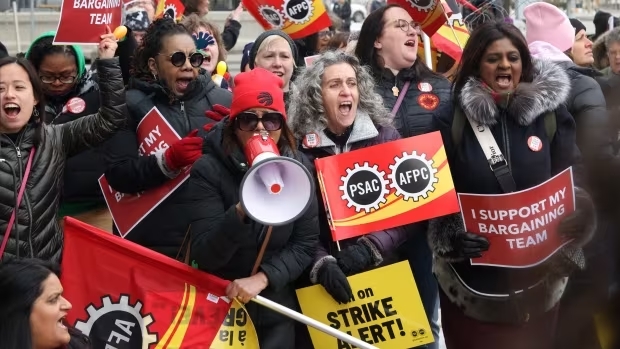- Over 155,000 federal public servants are set to strike after failing to reach an agreement with the government, impacting various departments and services across Canada.
- Key issues include wage increases, improved working conditions, and addressing the high cost of living for servants.
- Essential servants will continue to work, but the strike may cause slowdowns or temporary shutdowns of some government services nationwide.
Over 155,000 federal public servants are set to strike on Wednesday after the Public Service Alliance of Canada (PSAC) and the federal government failed to reach an agreement before the Tuesday evening deadline. Two bargaining groups, representing a significant portion of the government workforce, legally entered a strike position last week. This strike will affect public servants across various departments and agencies.
Strike Action Begins, Public Servants Ready for Negotiations
National PSAC president, Chris Aylward, announced that the strike action involving federal servants will commence at 12:01 a.m. ET on Wednesday. Although both sides are still apart on key issues, they remain at the bargaining table in hopes of reaching a tentative agreement. Public servants and union members are prepared to fight for a fair collective agreement.
Public Servants Picketing Across the Country
By Wednesday morning, federal servants and union members will be present at picket lines at over 250 locations nationwide. Aylward declined to disclose specific details about the ongoing discussions between the federal government and servants but stated that the union will remain on strike until its demands are addressed.
Government Claims Fair Offer for Public Servants on the Table
The Treasury Board of Canada Secretariat released a statement saying it has done everything possible to reach a deal with servants and that the government has presented a fair, competitive offer. However, PSAC, representing the public servants, continues to insist on demands that the government claims are unaffordable and would severely impact service delivery to Canadians.
Over 155,000 Public Servants in Legal Strike Position
More than 120,000 public servants represented by PSAC entered a legal strike position last Wednesday, with another 35,000 joining them last Friday. The first group, known as the Treasury Board group, includes servants across over 20 departments and agencies. The second group comprises around 35,000 Canada Revenue Agency (CRA) servants.
Essential Public Servants Continue to Work
Approximately 47,000 public servants are considered essential and will continue to report to work, even though they are in a legal strike position. The government defines essential services as those necessary for public safety or security at any time. These essential federal servants will ensure the continuity of critical services.
Potential Impact on Public Servants and Services
A strike could affect various services provided by servants, including the processing of income tax returns and passports. The federal government has compiled a list of 23 departments and agencies that would be affected by a strike involving federal servants.
Negotiations and Disagreements Between Government and Public Servants
Negotiations between the federal government and public sector workers, represented by PSAC, began in June 2021 but reached an impasse in May 2022. Strike votes for the Treasury Board group of servants occurred from February 22 to April 11, while strike votes for the CRA group of servants took place from January 31 until last week. PSAC didn’t disclose the number of servants who voted in favor, but Aylward said an “overwhelming majority” voted for a strike mandate.
Wage Proposals and Public Servants’ Cost of Living Concerns
The federal government seeks agreements that are fair for public servants and taxpayers, claiming to have a good offer on the table. Aylward stated that most federal servants earn between $40,000 and $65,000 a year and are struggling with the high cost of living. The union’s last public wage proposal for the servants was 4.5% for 2021, 2022, and 2023, while the Treasury Board offered a 9% increase over three years, reflecting recommendations from the Public Interest Commission. Public sector workers and the union argue that the government’s offer does not adequately address the rising cost of living and the financial challenges faced by many servants.
You might be interested in…
- Federal Government Restores Funding To Hockey Canada With Important Conditions
- The Growth of Federal Public Service Employment and Budget under Justin Trudeau’s Government
Public Servants Seeking Improved Working Conditions
In addition to wage increases, public servants are seeking better working conditions, job security, and improved benefits. The union representing servants is determined to ensure that the government addresses these concerns and provides a fair and competitive package for its workforce.
Strike Impact on Canadians
The strike by could lead to slowdowns or even temporary shutdowns of some government services nationwide. This may affect Canadians who rely on these services, creating an urgency for the government and the union to reach an agreement that satisfies both servants and the Canadian public.
The Role of Public Servants in Canadian Society
Public servants play a vital role in providing essential services to Canadians, ensuring the smooth functioning of various departments and agencies. Their work impacts millions of people, making it crucial for the government to recognize the importance of federal servants and provide them with fair compensation and working conditions.
Future Outlook for Public Servants and Government Negotiations
As the strike unfolds, it remains to be seen how long it will take for the government and the union representing the public sector workers to reach an agreement. Both parties must engage in constructive dialogue to address the concerns of public servants and find a resolution that benefits all stakeholders involved.












